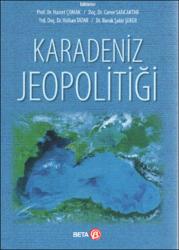| dc.contributor.author | Seyaz, Adnan | |
| dc.date | 2020-05-07 | |
| dc.date.accessioned | 2020-05-13T12:50:44Z | |
| dc.date.available | 2020-05-13T12:50:44Z | |
| dc.date.issued | 2018-01-30 | |
| dc.identifier.citation | SEYAZ, Adnan. “Black Sea Security in the Context of NATO-Russia Relations Since March 2014”, ss. 391-401, İçinde: Hasret Çomak, et al. Karadeniz Jeopolitiği (İstanbul: Beta Yayınları, 2018) | |
| dc.identifier.uri | https://hdl.handle.net/20.500.11857/1341 | |
| dc.description.abstract | The annexation of Crimea in March 2014 alarmed mostly Eastern European Members of the Alliance as well as USA and three large Europeans in NATO (Germany, France and Britain). Similar processes had been experienced between Georgia and Russia both between 1990 and 1992 and in summer 2008. These clashes are not a coincidence since Russia’s Black Sea Fleet (BSF) has stationed in Crimea for almost two centuries. Considering coastal countries of the Black Sea the inclusion of Turkey into the Alliance in 1952 was the first setback for Russia’s dream of controlling the Straits and thus Black Sea in total. Possible Georgian and Ukrainian inclusion in NATO, following Bulgarian and Romanian inclusion in 2004, would most probably be the end of the Russian dream of controlling Black Sea. However, Russian Federation under Putin responded these developments by eliminating Georgia through a military intervention, Ukraine through both invading Crimea and intervening Eastern Ukraine. Thus it became clear that Black Sea Region would continue to be a space of maneuver for both NATO and Russian Federation, proving those who claimed that a New Cold War is underway. One might not forget that Russia is a huge country with huge abilities and NATO is a security block which needs to stay together and strong in order to deter such a rival. That is why the Warsaw Summit’s decision to allocate more armed forces to NATO’s eastern front is a significant step to respond Russia, but building alliance members’ consensus is much more important. I believe that if NATO members achieve coming together around a certain policy it will work in deterring Russia rather than antagonizing. Within this framework, I will try to explain how tense relations among the NATO and Russia affected the Black Sea Security after the annexation of Crimea. | |
| dc.language.iso | eng | |
| dc.publisher | Beta Yayınları | |
| dc.rights | info:eu-repo/semantics/openAccess | |
| dc.rights.uri | http://creativecommons.org/licenses/by-nc-nd/3.0/us/ | * |
| dc.subject | Black Sea Security | |
| dc.subject | Annihilation of Crimea | |
| dc.subject | NATO-Russia Relations | |
| dc.title | Black Sea Security in the Context of Nato-Russia Relations Since March 2014 | |
| dc.title.alternative | Mart 2014 Sonrası NATO-Rusya İlişkileri Çerçevesinde Karadeniz Güvenliği | |
| dc.type | bookPart | |
| dc.department | Fakülteler, İktisadi ve İdari Bilimler Fakültesi, Uluslararası İlişkiler Bölümü | |
| dc.relation.publicationcategory | Kitap Bölümü - Uluslararası | |
| dc.institutionauthor | Seyaz, Adnan | |





















